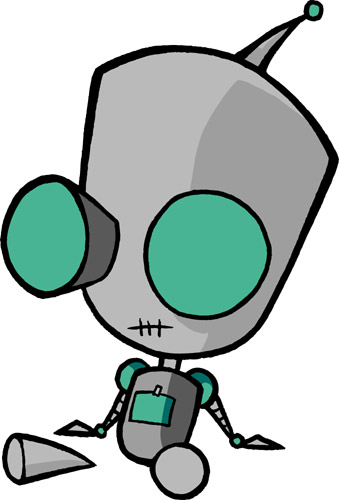June 13, 2005
Neuro Tidbit#1
You asked for it, you got it.
Parkinson's Disease strikes the neurons of the Nigrostriatal pathway, that is, the dopamine-releasing neurons whose cell bodies reside in the Substantia Nigra and synapse in the striatum (also known as the caudate/putamen). You generally have to lose about 90% of those neurons to get any symptoms. Really. The CNS covers its own a$$.
Interestingly enough, Huntington's Disease strikes the reciprocal connections, from the caudate to the SN, and elsewhere.....
Here's a brainstem cross-section of a PD patient and a person who died from something else. Not surprisingly, the substantia nigra is the black band near the bottom-middle.

June 15, 2005
Done! (with lecturing, anyway)
Just finished putting together my LAST lecture for the class. Now all I have to do is write a test for Friday and grade them and the papers that will get turned in then, too.
Yay!!
Here's Today's Neuro Bit:
Schizophrenia means "divided mind". It was first reported in 1896 by Emil Kraepelin, who called it "dementia praecox", and is only marginally better understood today. About 0.1% of the population (1 person in 1000) is schizophrenic. The phrase "Thorazine shuffle" was coined by mental health staff who observed the characteristic rigidity that Thorazine induced in patients who took the drug for many years.
September 19, 2005
Interesting Schizophrenia update
Conventional wisdom in the Schizophrenia game has long held that the newer class of drugs, usually referred to as atypical antipsychotics, is more effective in treating both the positive and negative symptoms of Schizophrenia. Specifically, it is widely known that older drugs, such as Haldol (haloperidol), fail to treat any of the negative symptoms (such as lack of affect and anhedonia).
However, a new study released today in the New England Journal of Medicine (by my former advisor and several of his colleagues that I know well and have worked with) shows that only Zyprexa (olanzapine) is really any better than prior treatments, despite the difficult side effects (weight gain and development of type II diabetes in some patients)....
This study is a product of a long term NIH funded study of early intervention in Schizophrenia by clinical screening and antipsychotic treatment.
You can read the mainstream press article here, the journal article here, and information about the CATIE study here.
October 11, 2005
More Schizophrenia News
The other CATIE study was released today in the Americn Journal of Psychiatry. Several researchers I worked with at UNC were involved in this story, and I think it's an important one.
In this study, researchers found that early intervention with antipsychotic treatment after a first episode improved long term outcome.
This has long been a hot button issue in the treatment of Schizophrenia. Prolonged, or multiple breaks are required for a complete diagnosis, and much of the testing that needs to be done should be done without meds on board, so it frequently takes a while for patients to get on a maintenance dose of antipsychotics. Furthermore, if the first episode is not severe, patients may not get treated until their symptoms worsen. This study looks at those patients, and discovers that the earlier treatment starts, te better the outcome.
This is not surprising, since we view Schizophrenia as a developmental disorder that lies dormant until triggered, probably by stress, usually in the second decade of life. If a person is showing a propensity to have a psychotic break and then devolve into frank Schizophrenia, treating them early simply gives us a headstart on their illness. If we can keep a patient from getting too sick to be independent or from losing their cognitive skills, then we've gone a long way towards keeping Schizophrenia from controlling their lives and allowing them to be normal.
The abstract is here. Unfortunately the full study is hidden behind a fee....
November 28, 2005
This is a bit much
From Stingflower of new bloggy find Harshly Mellow, who also finds this creepy:
A tenth of two to five-year-olds have a serious psychiatric illness, yet most cases are being missed, warn experts.The problems go beyond tantrums and bad behaviour and impact negatively on all aspects of an infant's life, the Institute of Psychiatry will hear.
And failure to spot and treat these conditions early is causing unnecessary distress and suffering.
Mental health services need to be geared towards very young children as a matter of urgency, they said.
WTF??? 10% of all two year olds are mentally ill? Riiiight.
Since when is "normal" the 90th percentile in ANY marker of childhood development?
I think what's going on here is simply a misguided consequence of the laudible efforts of pediatric practitioners to identify serious developmental disorders sooner. For example, some studies indicate that the incidence of autism is increasing in some areas over the past 20-30 years. However, it's not clear whether the reported increase is due to more actual new cases of the disorder, or to slightly lessened diagnostic criteria, implemented in an effort to diagnose children at an earlier age so that intervention can be started sooner.
It's entirely plausible that 10% of toddlers display behaviors that mark them as "at risk" of developing personality disorders or ADHD or what have you. However, as psychiatrists have learned repeatedly in following patients predisposed to mood disorder, schizophrenia, etc., the risk of development or even the appearance of frank prodromal symptoms (in the case of Schizophrenia) is no guarantee that the patient will progress to illness. So it's, at the least, reaching a bit to say that 1 out of every 10 young children has a serious disorder.
Which brings me to my other point. Isn't it a bit much to say that one in ten kids has a serious disorder? How serious can it be if it is SO prevalent? Is it possible that our definition of normal is just a tad skewed by the ready availability of drugs and treatments that make our kids fit into tidy little polite boxes? And these are as young as two years old. Ever heard of the terrible twos? Some kids are more terrible than others. Throwing temper tantrums and trying to assert dominance is normal for a toddler or a preschooler. It does not require medication. Just a little time, patience, and firmness from mom and dad. Oh wait. Mom and Dad don't have time anymore, and anyway, being firm with your kids doesn't make friends with them.
Arrgh. This is exactly why I don't want to have kids. I can't be a parent of the state.
January 26, 2006
WooHoo!
Not that any of you care, but my first multi-million dollar grant application is going out the door this afternoon. Well, ok, not mine alone, but I am Co-PI. Holy Crap!
Damn I feel old. This time last year I was writing my thesis.....
August 10, 2006
Your daily rant
don't fucking get me started on these quacks.
Here's what got me:
"Head cases
A few neurological differences between women and men from Louann Brizendine's "The Female Brain":
Thoughts about sex enter women's brains once every couple of days; for men, thoughts about sex occur every minute.
Women use 20,000 words per day; men use 7,000 per day.
Women excel at knowing what people are feeling; men have difficulty spotting an emotion unless someone cries or threatens bodily harm.
Women remember fights that a man insists never happened.
Women over 50 are more likely to initiate divorce."NONE OF THESE ARE NEUROLOGICAL DIFFERENCES!
SOME of them have to do with functionality/ functional outcome, but for FUCK's SAKE, is it AT ALL responsible to say that because a woman is over 50 that she files for divorce because her brain is hard-wired to do so???? I mean COME ON.
MAYBE MAYBE you COULD make the case that women's brains are MORE dependent on the influence of sex hormones than men's and that after menopause function is decreased BECAUSE hormone levels drop.
Sorry to be so mad, but while I am technically a developmental neurobiologist, I am ALSO a neuroendocrinologist. Which means I study how hormone signals affect the brain. This is my field, folks.
It is ENTIRELY not clear that the differences in the way women and men think are at all somatic (body-based) rather than socially nurtured. There is a growing body of evidence that Estrogen and Testosterone drive certain biological processes in the brain, HOWEVER, E and T are both converted to the same physiologically active molecule (they're not that different to begin with). Some of the proposed difference may have to do with feedback mechanisms based on progesterone (P), which women have in abundance compared to men.
The idiot who wrote this book argues that women's brains are "wired for communication". Sure, fine, but IT IS NOT AT ALL CLEAR based on the available evidence that this wiring is a direct effect of having 2 X chromosomes. MUCH of the wiring in our brains, and in fact the very essence of what we believe about learning and memory, is based on our experience. The neurological imprint of experience shapes the pattern of wiring in our brains. If we speak multiple languages as children, for example, we are more able as adults to learn and comprehend multiple languages, as our brains are wired for it. Because Estrogen and Progesterone affect the processes of wiring, that may play a small role, but clearly, experience is the basis of preferential wiring and preferential connectivity.
There are some anatomical differences in the brains of men and women. First of all, men have bigger brains. No shit. They have bigger bodies. They also have bigger feet. the overlap is also pretty significant. There are some small areas within the brain that are smaller or larger between the sexes, most notably an area in the hypothalamus smaller than the end of your pinky that is significantly different between the sexes (except, purportedly in homosexuals....) according to Simon LeVay back in the late 80s/early90s. He's a pretty well respected researcher, even though some of his stuff is pretty controversial, like that study.
Grrrr.
Also, she talks about hormone cycling and clinical trials, and thats no longer a valid excuse. Women MUST be included in ALL trials where a therapeutic benefit to females may be achieved (so, that's everything but things like prostate cancer or ED...). Women who participate in studies that may be affected by their hormones have to keep track of their cycles and note if they are taking any other medications that could alter hormone levels or function, such as birth control, HRT, anti-cholesterol medications (statins especially), and some antibiotics. These factors are generally accounted for, and generally make no difference.
To sum up, while the premise of the book is not entrely bogus, based on her arguments in the interview and the "neurological differences" presented at the end, it is clear that this book is full of inconclusive data and incomplete understanding, and should be viewed as a POSSIBLE explanation for some of the cognitive/ personality/ functional differences between the sexes. And a far too simple one, at that.
Just also wanted to point out that it appears that the author of this book is in fact a "real" scientist, who evidently publishes research about hormones and depression.... So perhaps this book is an extended theoretical paper.
September 19, 2006
A Gender Gap in Science?
This study came out recently, and I'm not sure how I feel about it. Ok, that's wrong. On the face, without having read the actual text yet, I disagree with [the media's presentation of] it ENTIRELY.
You see, there's a very important factor that either they've overlooked or the media has chosen not to report....
Let me explain:
First of all, I want to make it clear that I've never experienced that kind of discrimination personally. As an undergrad, while Caltech had 4 times as many males on campus as females, the Bio department was almost 50-50. In graduate school, out of about 30 students in my program, 6 were guys. My advisor was female, too. So was her postdoctoral advisor.
Here, half of my department is female, including our chair.
But on to my main point:
One thing the study doesn't seem to consider is that women often PREFER to opt out of the higher academic jobs because of the demanding schedule. We CHOOSE to remain in a comfortable lab, where our schedule is more flexible, we can work with the people we choose to work with, and we have time to be ourselves and actually SEE our families.
This is the elephant in the living room. Academic Science has many of them.
Sure, a lot of women who are Dr. Shalala's age and even up to 20 years younger had to deal with chauvinist pigs and glass ceilings and all that. They had to CHOOSE between a career and a family. Women scientists of MY generation can have both, and are frequently choosing personal fulfillment over professional, in many cases. I did. That's why I teach, rather than pursuing a traditional academic career track.
What these older chickies can't stand is the rearrangement of priorities in younger female scientists. They hate it that we wouldn't follow them blindly through the glass ceiling, that we can stop about a foot lower and say "Thanks, I'm good." That we refuse to blaze their trail just because it's there.
I'm not naive enough to say that discrimination DOESN'T exist. However, that doesn't mean that gender-based discrimination is the ONLY reason why women don't get the highest jobs in academic science and engineering. And it's naive of THEM to say otherwise.
February 20, 2007
Pregnancy may lead to a new therapy for MS
Researchers at the University of Calgary have discovered that the pregnancy associated hormone prolactin may be responsible for the reduction of MS symptoms usually occurring during pregnancy.
The study, published in the Journal of Neuroscience, indicated that prolactin could be used in people to repair damage caused by MS and improve their symptoms.It's a quite common finding that women with MANY different auto-immune disorders have fewer symptoms during their pregnancies. It will be EXTREMELY interesting to see if the prolactin findings can be extended to other disorders, and whether the mechanism of prolactin is specific to myelin production or facilitates increased myelin levels indirectly via a protection mechanism. Or if other pregnancy hormones have similar effects, especially as inflammatory exposure can have devastating effects on a developing fetus.
Pregnant mice had many more myelin-producing cells, known as oligodendrocytes, than virgin female mice of the same age, the study found.
The researchers destroyed myelin around the nerve cells in the mice, as occurs in MS. Two weeks later, the pregnant mice had twice as much new myelin as the other mice. When the scientists injected prolactin into the non-pregnant mice, their myelin similarly was repaired.
"The implications are that prolactin may be a molecule that can be tested in MS patients for stimulating repair," Samuel Weiss, director of the Hotchkiss Brain Institute at the University of Calgary and senior author of the study, said in an interview.
Prolactin increases in the body during pregnancy and is involved in stimulating milk production among other things.
July 03, 2007
Man is prone to evil as the sparks fly upward....
Babies as young as 6 months are capable of deception:
Behavioural experts have found that infants begin to lie from as young as six months. Simple fibs help to train them for more complex deceptions in later life.So babies are pushing their boundaries almost from day 1. It's really no surprise to a developmental biologist. Children's brains are built to explore, and from the moment they exit the womb they are continually surveying their environment for cues as to "the rules", this includes everything from object permanence to gravity, to the social niceties of their individual culture. These early manipulations are simply another form of exploration; that is, figuring out how to most effectively get the reward (attention, approval, toys, food, etc.) that they want.Until now, psychologists had thought the developing brains were not capable of the difficult art of lying until four years old.
Following studies of more than 50 children and interviews with parents, Dr Vasudevi Reddy, of the University of Portsmouth's psychology department, says she has identified seven categories of deception used between six months and three-years-old.
Infants quickly learnt that using tactics such as fake crying and pretend laughing could win them attention. By eight months, more difficult deceptions became apparent, such as concealing forbidden activities or trying to distract parents' attention.
By the age of two, toddlers could use far more devious techniques, such as bluffing when threatened with a punishment.
Dr Reddy said: "Fake crying is one of the earliest forms of deception to emerge, and infants use it to get attention even though nothing is wrong. You can tell, as they will then pause while they wait to hear if their mother is responding, before crying again.
"It demonstrates they're clearly able to distinguish that what they are doing will have an effect. This is essentially all adults do when they tell lies, except in adults it becomes more morally loaded."
It kind of makes me sad though, as I'd prefer to see babies as little innocents, rather than this more cynical view of children as pre-programed manipulation machines.
Oh, and 10 points to the first person who identifies the source of the title....don't Google it, Google has a bunch of sources....
h/t Wired Science
September 03, 2007
From the DUUUUUH file
Kids whose parents model responsible drinking at home, including letting the child have small amounts of alcohol in a family setting, are ONE THIRD as likely to develop severe binge-drinking behaviors in their teen and young adult years.
From the Wall Street Journal:
What kind of parents would ever allow their children to drink at home? Doesn't this put youngsters at risk?So why file this under DUH? Because it's the first principle of adolescent psychology: If you want a kid to NOT do something, take away its taboo. The driving force of childhood is to find one's place in the world. To learn the rules and decide which are important to follow, and which aren't. Teenagers in particular make this an art form, with their kid's minds in little adult bodies. Kids who occasionally share small amounts of alcohol with their parents do not see drinking as either rebellion or escape, because it's something they do in the confines of the family. It's just not "cool" if Mom and Dad do it with you, right?
The answer to the first question is simple. Most of the state laws include a specific exemption for children drinking at home during family and religious ceremonies. Observant Jews, for example, traditionally serve children small glasses of wine during Friday night Sabbath ceremonies. Other cultures also begin socializing children into drinking at an early age--including Mediterranean societies such as Italy, Greece and Turkey (and non-Mediterranean societies such as China).
As for the second, two international surveys--one conducted by the World Health Organization--revealed that these Mediterranean countries and Israel had the lowest binge drinking rates among European adolescents.
In societies where children drink with their parents, this typically means giving a kid a small amount of wine or other alcohol, often watered down on special occasions or a family dinner. Many European countries also lower the drinking age for children when they are accompanied by parents. In the United Kingdom, for example, the legal age is 18, but for a family at a restaurant it is 16. In France and Italy, where the legal age is 16, there is no age limit for children drinking with parents.
But what might all of this mean for teen drinking problems in America?
Several studies have shown that the younger kids are when they start to drink, the more likely they are to develop severe drinking problems. But the kind of drinking these studies mean--drinking in the woods to get bombed or at unattended homes--is particularly high risk.
Research published in the Journal of Adolescent Health in 2004 found that adolescents whose parents permitted them to attend unchaperoned parties where drinking occurred had twice the average binge-drinking rate. But the study also had another, more arresting conclusion: Children whose parents introduced drinking to the children at home were one-third as likely to binge.
"It appears that parents who model responsible drinking behaviors have the potential to teach their children the same," noted Kristie Foley, the principal author of the study. While the phrasing was cautious, the implication of the study's finding needs to be highlighted: Parents who do not introduce children to alcohol in a home setting might be setting them up to become binge drinkers later on. You will not likely hear this at your school's parent drug- and alcohol-awareness nights.
This is not to say that it's ok for parents to do this with other drugs. Alcohol is the least likely of the drugs of abuse to have adverse consequences on brain development, especially in the small quantities relevant to these studies. A single dose of cough syrup is likely to have more alcohol in it that whatever a child consumes in a responsible home setting.
Nice to see common sense coming out of psychosocial research for a change.
h/t HWNNL
October 30, 2007
This wasn't a surprise
As I am clearly not Aspie. But the number of questions about sneaking up on people was!
The Aspie quiz:
h/t Jay
July 15, 2008
I don't need your affirmative action OR your pity
According to some, the "lack" of women in science and engineering is so critical that Title IX-like protections should be put in place until women are equally represented.
Are you f*cking kidding me? Women have no barriers in science, probably fewer than in any other general field. Over half of students entering medical school this year are women. More than 60% of graduate students in biology and biochemistry and psychology are female. My department chair is a woman. There's no lack of women in science, even at the highest levels.
Yes, you might argue, but the article focuses on Physics and Engineering. And true, there are relatively few women in physics and engineering. But is it possible that maybe women don't choose these fields because they are less interested? Should we force girls into jobs they don't want? It's not like the demands of an academic career in physics are that different from the demands of an academic career in biology or biochemistry. Which even these researchers had to admit was the case:
[T]he institute found that women with physics degrees go on to doctorates, teaching jobs and tenure at the same rate that men do. The gender gap is a result of earlier decisions. While girls make up nearly half of high school physics students, they're less likely than boys to take Advanced Placement courses or go on to a college degree in physics.(emphasis mine)At least the Universities so far are ignoring it:
So far, these Title IX compliance reviews haven't had much visible impact on campuses beyond inspiring a few complaints from faculty members. (The journal Science quoted Amber Miller, a physicist at Columbia, as calling her interview "a complete waste of time.") But some critics fear that the process could lead to a quota system that could seriously hurt scientific research and do more harm than good for women.Yep. And considering today's cuts in research funding and endless Federal investigations looking for reasons to increase cuts, this could be a nightmare for small institutions that don't have the resources to bring in enough female scientists to meet an arbitrary quota.
January 04, 2010
Everyone else is doing it.....
Taking a cue from Shannon, Rachel, Bou, and many others, I thought I'd do a decade-in-review as well.
So it turns out this is just part 1. Wow. Crazy.
1999
'99 was a huge year for me, I got my engagement ring, interviewed for, and was accepted to graduate school, graduated from Caltech, adopted my Princess, got married, and moved to NC, all before August. Then we lived through 2 hurricanes, I started grad school, DH got his army orders, and we celebrated our first Thanksgiving as a married couple the night before he left for Ft. Sill. We celebrated Christmas together at home in Fresno (yay for leave!) and rung in the millenium in my parents' living room, all the while laughing at the Y2K fools.
2000
2000 started off with a blizzard. Back in North Carolina again, I think it snowed the whole month. At one point I measured 30" of snow on our back stoop. I fell on the ice and broke my tailbone. We got broadband internet for the first time. I was addicted. In the spring I taught my first General Biology classes and fell in love with developmental neurobiology. DH was transferred to Aberdeen Proving Ground for more training, and I got my first sight of Washington DC traveling to see him. On that trip I also discovered IKEAs in both VA and MD (YAY!). I brought him home in May for 3 weeks of TDY before shipping him off to Ft. Hood. Dipshit Stalker (who was the best man at our wedding) arrived in July, emotionally destroyed after a failed marriage and lost military career. He was good until he found an outlet to start drinking again.... More on that later. In August I dropped a pot of spaghetti down the sink and KNEW that the pain I was having couldn't be good for me. I was subsequently diagnosed with Rheumatoid Arthritis and started the odyssey of drugs, therapy, and bullshit that I have been on for almost 10 years now. DH came home for Christmas, and we celebrated our first Christmas alone together. I admit, I went a little overboard, as I bought him what turned out to be a roomful of Star Wars toys.
2001
After much indecision and not a little prodding from my program, I chose a thesis project, and began working on brain development in Schizophrenia. In June we moved out of the apartment into our house in the country, dipshit stalker and his friends doing all the heavy lifting. I paid them amply with beer and barbecue About the same time I took and passed my qualifying exams, and DH, home on leave at the time, had his now-infamous drunk moment at the Carolina Brewery (ask him. Funny!). I flew home to CA for two weeks in July, best ticket deal ever ($197 round trip to LAX via Atlanta!). In late August, DH and a friend conspired to surprise me, and he flew home on the same flight as the friend I was picking up at the airport. He returned to Texas on September 9 so his unit could prepare for a field exercise scheduled to begin on 9/12. My other friend was scheduled to fly out on the afternoon of September 11. She eventually left on 9/26.
I was awakened on 9/11 by the ringing of the phone. My husband, eating breakfast and watching TV in the barracks had seen the first plane hit the Towers. I turned on the TV just in time to see the second. You know the rest. I was numb and frightened for weeks, addicted to the TV.
DH eventually learned that he was not being deployed anywhere, and came home for Christmas, and the rest of the year passed quietly.
2002
We spent New Years at Carolina Beach, and rang in the new year on the sand with poppers and champagne and group of friends, getting up in the morning at 5 am to get donuts from Krispy Kreme in Wilmington and watch the sunrise over the beach.
I continued working on my project and teaching. We made plans for DH to begin earning his MAT when he finished his 3 year conscription. I planted a garden, which the deer mostly ignored, and repainted the kitchen.
In the aftermath of 9/11 I discovered blogs. My first "addictions" were Lt. Smash, a geek blogger named Jay Solo, The Accidental Jedi, and Dean's World.
Dipshit stalker got drunk one night, threw a tantrum, and threatened my life. When I called him on it and threw him out, he hit me. I called the cops. They arrested him at work, gave him a TRO, and someone blew up my mailbox that night. I barely slept the next 6 months and left every light on. I got to know most of the Orange County deputy sheriffs. Once they found out about what kind of military training he had, they circled my driveway every night for months, making sure he wasn't lurking somewhere in the woods surrounding the house. Now you understand why I love cops.
In October, my Neon committed suicide under a Ryder truck (tire separation), and we got the Escape. In November, DH's contract finished, and he came home just in time for Thanksgiving, and then the storm of the century. Ice fell from the skies and clogged up everything. It was 6 degrees outside, and hundreds of trees fell from the weight of the ice. We had three trees down in our driveway alone. All the power was out for 7 days: no heat, water, stove, toilets, etc. Everything in our house (including the water pump) was electric. Thank God for the snow: it was like a great big natural freezer, so the food was good. A tree fell on our brand new car, necessitating the first of many trips to the body shop.
2003
The year began with a bang. Two of our friends from LA flew in just before New Years, and we drove to Miami to see USC in the Orange Bowl vs. Iowa. Of course we won. It was also my first trip to Pedro's South of the Border and the fireworks mecca that is South Carolina. We made record time coming home, as we started listening to the National Championship game in Florida and saw the last two plays on our own TV. DH and I were both in school, me working on rat brains, and him first taking referesher science classes, and then beginning his MAT program. It was a super productive year, workwise, generating the data that would be my first two papers. dipshit stalker (although we can't prove it) broke into our house and stole some cash and my digital camera. Of course, it could have been a junkie, but then why didn't the other things of value walk away? And how come only certain drawers were opened?
2004
DH finished his MAT program and got a job teaching in Chatham county. I got my first paper published. In June we moved back into town so I could ride the bus to school (free in Chapel Hill!). We became addicted to ESPN. I started blogging (here) (finally!) after being a serial commenter for many, many years. Many of you became real friends, and not just people online. I taught myself to knit and crochet, and I learned the secrets of NC pig aka Eastern NC barbecue. In August we finally traveled to DC for real, road-tripping with the same football friends to the Black Coaches' Classic versus Virginia Tech at Fed Ex field. We stayed in Landover and rode the Metro into the city, and walked around the Mall and the museums. My favorite memory of the trip is sitting on the steps of the Lincoln Memorial around 1 am, looking down the Mall.
2005
2005 began with my advisor's announcement that he was leaving, so I needed to finish my project. The winter was a whirl of surgery, explants, and writing, and I passed my committee in May. In fact, I passed my thesis, left school, got on a plane, and flew to CA to look for a place to live. We were coming home. I finally got to meet a TON of my Bear Flag League blog colleagues at a brunch while we were in town. We returned to to NC finish the school year. I taught neuroscience, gave my public defense, and on the last day of June we packed up the moving truck and our car and left NC behind. We road tripped home, taking the 90 across through South Dakota, Wyoming, and Montana. We met my blogchild (Paul) in Wisconsin, and had a crazy memorable dinner with Margi and family in Spokane. We spent the 4th of July at Mount Rushmore.
Arriving in CA, we thought I had a job, and DH would be interviewing. We settled on Pasadena, near my putative job, and with plenty of opportunities for him. We chose a townhouse, and that afternoon I found out my job wasn't going to happen. His however, DID come through, and he was hired after his first interview, for a job he still loves. The townhouse came through just in time for the movers to drop off our things, and the next day we hurried back to Fresno for our friends' wedding. I looked for jobs all through the rest of the summer, and in October I was hired for a job I hadn't applied for, and which was, in fact, better! After I received my first paycheck, the first thing we did was go out and buy a sofa, since we left most of our furniture in NC. I still miss my orange chair, for the record. One of my biggest regrets is being talked into leaving it and my desk behind.














